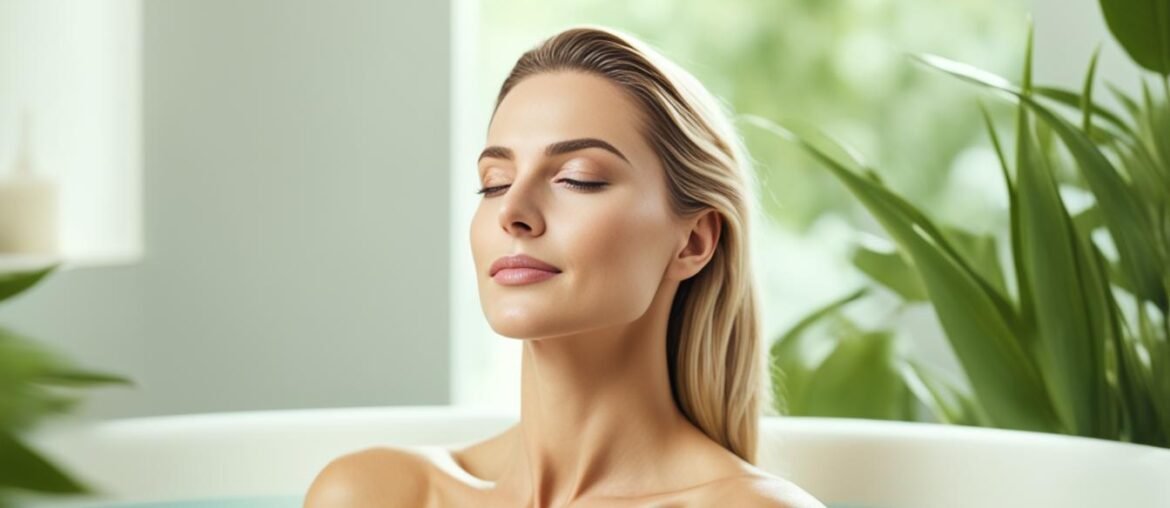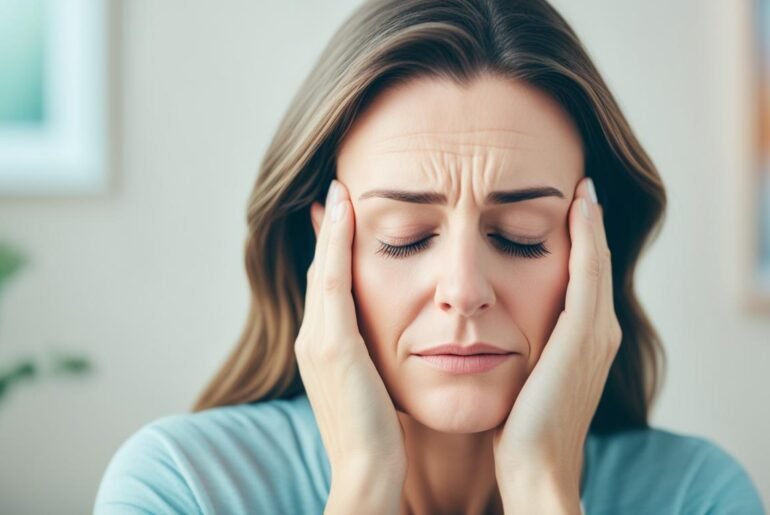Did you know that stress can make you appear up to 3.5 years older? Scientific research has shown that high levels of stress can have a significant impact on the aging process of the skin, leading to premature aging and various skin issues.
When you are stressed, your body releases cortisol and other stress hormones, which can cause dehydration, sallowness, roughness, and the development of deep expression lines. Stress can also speed up the aging process, resulting in premature aging skin.
But don’t worry! There are effective ways to prevent stress-induced skin aging and keep your skin looking youthful and vibrant. In this article, I will share valuable tips and strategies to help you combat the effects of stress on your skin. By following these practices, you can maintain a healthy and radiant complexion.
Key Takeaways:
- Stress can make you appear up to 3.5 years older.
- High levels of stress can lead to premature aging and various skin issues.
- Stress triggers the release of cortisol and other stress hormones, causing dehydration, sallowness, roughness, and deep expression lines.
- There are effective ways to prevent stress-induced skin aging and maintain a healthy and radiant complexion.
The Effects of Stress on Skin
Stress has significant effects on the skin, leading to various signs of stress-induced aging. When we experience stress, the body releases stress hormones, including cortisol, that can have a profound impact on our skin’s health and appearance. Understanding these effects is crucial in developing effective strategies to prevent stress-related skin aging.
One of the visible signs of stress aging is skin dehydration, as stress hormones can disrupt the skin’s moisture balance. The skin may become dry, tight, and lackluster, losing its natural radiance.
In addition, stress can lead to rough skin texture, making the skin feel uneven and rough to the touch. This roughness is often accompanied by a dull, sallow complexion, further contributing to the appearance of aging.
Another common effect of stress on the skin is the development of deep expression lines. Elevated levels of stress hormones can cause increased muscle tension and repeated facial expressions, resulting in the formation of lines and wrinkles.
Effects of Stress on Skin:
- Skin dehydration
- Rough skin texture
- Sallow complexion
- Deep expression lines
It’s important to note that stress-induced aging doesn’t occur overnight but rather accumulates over time. The long-term impact of stress on the skin can accelerate the aging process, leading to premature aging skin.
To illustrate, here is a table summarizing the effects of stress on the skin:
| Effect | Description |
|---|---|
| Skin Dehydration | Disruption of the skin’s moisture balance, leading to dryness and tightness. |
| Rough Skin Texture | Uneven skin surface that feels rough and lacks smoothness. |
| Sallow Complexion | Dull and lackluster skin tone, resulting in a tired appearance. |
| Deep Expression Lines | Pronounced lines and wrinkles caused by muscle tension and repeated facial expressions. |
By understanding how stress affects the skin, we can implement preventive measures to combat stress-induced aging. In the next section, we will delve deeper into the connection between stress and skin aging, providing valuable insights into the impact of stress hormones on our skin’s health and appearance.
Understanding the Connection Between Stress and Skin Aging
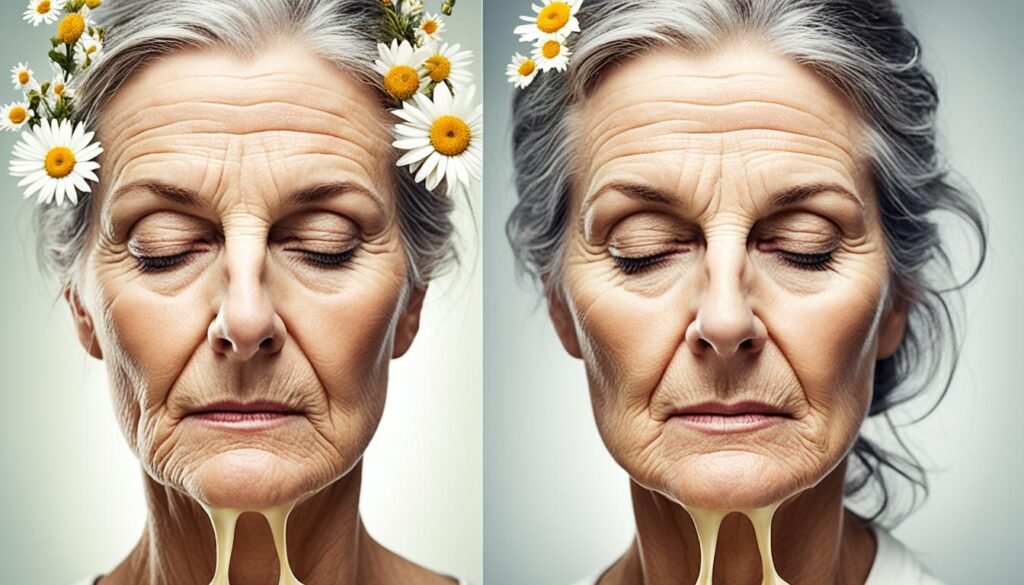
Stress has a profound impact on the aging process of our skin, and understanding the connection between stress and skin aging is crucial for effective prevention. One of the key factors in this connection is the influence of stress hormones, particularly cortisol, on the skin.
The constant release of cortisol in response to stress can have detrimental effects on the skin’s health and appearance. The elevated levels of cortisol can lead to skin dehydration, resulting in dullness and sallowness. Additionally, stress hormones can contribute to skin roughness and the formation of deep expression lines.
By recognizing the influence of stress hormones on the skin, individuals can take proactive steps to prevent stress-induced skin aging. One of the most effective approaches is stress control. By managing and reducing stress levels, we can minimize the release of cortisol and its negative impact on our skin.
Implementing stress management techniques such as meditation, deep breathing exercises, and engaging in stress-reducing activities can significantly contribute to preventing skin aging caused by stress. By prioritizing stress control, we can maintain healthier, more youthful-looking skin for longer.
The Four-Step Wellness Regimen to Combat Stress Aging
When it comes to preventing stress-induced skin aging, a holistic approach is essential. Dr. Howard Murad recommends a comprehensive four-step wellness regimen that combines internal and external skin care along with stress management techniques. By addressing the root causes of stress aging and nourishing the skin from within, this approach aims to promote optimal skin health and vitality.
Mindfulness and Stress Management Techniques
Managing stress is crucial for preventing stress-induced skin aging. Incorporating mindfulness techniques, such as meditation and deep breathing exercises, into your daily routine can help calm the mind, reduce stress levels, and promote overall well-being. Taking time for self-care and engaging in stress-relieving activities can also contribute to healthier, more youthful-looking skin.
Regular Exercise for Skin Health
Exercise not only benefits your overall health but also plays a significant role in the prevention of stress aging. By increasing blood circulation and oxygen delivery to the skin, regular physical activity helps nourish the skin cells, promotes collagen production, and reduces the appearance of wrinkles. Aim for at least 30 minutes of moderate-intensity exercise most days of the week to reap the skin-boosting benefits.
A Balanced Diet for Skin Vitality
What you put into your body can profoundly impact your skin’s health and appearance. Adopting a skin-friendly diet rich in antioxidants, vitamins, and minerals can provide the necessary nutrients for skin vitality. Incorporate plenty of fruits, vegetables, whole grains, lean proteins, and healthy fats into your meals to support your skin’s natural defense mechanisms and prevent stress-induced aging.
Topical Skincare Products for Stress Aging
External care is just as important as internal care when it comes to combating stress aging. Utilizing topical skincare products specifically formulated to address stress-related skin concerns can help nourish, hydrate, and protect the skin. Look for products containing antioxidants, hyaluronic acid, and peptides to combat the signs of stress-induced aging and maintain a youthful complexion.
A four-step wellness regimen that encompasses mindfulness, exercise, a balanced diet, and topical skincare products is a powerful combination for preventing stress-induced skin aging. By adopting this holistic approach and making self-care a priority, you can effectively combat the damaging effects of stress on your skin and maintain a radiant, youthful appearance.
Mindful Stress Management Techniques

Being kind to your mind and practicing mindful stress management techniques can significantly impact skin health. In addition to a comprehensive wellness regimen, incorporating activities that promote relaxation and stress reduction is essential for preventing stress-induced skin aging.
Meditation for Stress Relief
Meditation is a powerful tool for managing stress and promoting overall well-being. By taking a few moments each day to sit quietly and focus on your breath, you can calm your mind, reduce stress levels, and cultivate a sense of inner peace. Meditation has been found to lower cortisol levels, the stress hormone that contributes to skin aging. So, find a quiet space, close your eyes, and let your mind and body relax as you practice the art of meditation.
Deep Breathing Exercises
Deep breathing exercises are another effective technique for relieving stress and promoting relaxation. By focusing on your breath and taking slow, deep breaths, you can activate the body’s relaxation response and reduce stress levels. Deep breathing helps oxygenate the body, promoting a sense of calm and mental clarity. Incorporating deep breathing exercises into your daily routine can help alleviate tension and improve your overall well-being.
Engaging in Stress Relief Activities
Engaging in activities that bring you joy and relaxation can have a profound impact on your stress levels and, consequently, your skin health. Whether it’s pursuing a hobby, spending time in nature, or engaging in creative pursuits like painting or writing, finding activities that provide stress relief is crucial. These activities divert your attention from stressors, promote positive emotions, and allow you to recharge and rejuvenate.
Watching Funny Movies
Laughter is truly the best medicine when it comes to reducing stress. Watching funny movies or engaging in activities that make you laugh can trigger the release of endorphins, the body’s natural feel-good chemicals. These endorphins help alleviate stress, boost your mood, and have a positive impact on your skin health. So, grab some popcorn, cozy up on the couch, and let the laughter wash away your stress!
| Benefits of Mindful Stress Management Techniques: | Examples |
|---|---|
| Reduces stress levels | Regular meditation practice |
| Promotes mental clarity | Deep breathing exercises |
| Enhances overall well-being | Engaging in stress relief activities |
| Boosts mood and positivity | Watching funny movies |
The Role of Exercise in Stress Aging Prevention
Regular exercise is a powerful tool not only for overall health but also for preventing stress-induced skin aging. Engaging in physical activity plays a crucial role in maintaining skin health and combatting the effects of stress on the skin.
One of the key benefits of exercise for the skin is improved circulation. When you exercise, your heart rate increases, pumping more blood throughout your body, including your skin. This increased blood flow delivers essential oxygen and nutrients to your skin cells, promoting their health and vitality.
By improving circulation, exercise also helps in reducing the appearance of wrinkles and promoting a younger-looking complexion. When your skin receives an adequate supply of oxygen and nutrients, it becomes more resilient and better able to repair itself, resulting in a smoother and more youthful appearance.
Regular physical activity has also been shown to have a positive impact on stress levels. Exercise releases endorphins, also known as “feel-good” hormones, which can help reduce stress and improve mood. By reducing stress, exercise indirectly contributes to preventing stress-related skin aging.
The benefits of exercise for the skin include:
- Improved circulation for a youthful glow
- Enhanced delivery of oxygen and nutrients to skin cells
- Reduced appearance of wrinkles and fine lines
- Stress reduction for overall skin health
To incorporate exercise into your stress aging prevention routine, try to engage in at least 30 minutes of moderate-intensity aerobic activity on most days of the week. This can include activities such as brisk walking, jogging, cycling, swimming, or dancing. Find activities that you enjoy and make them a regular part of your lifestyle.
Remember, always consult with your healthcare professional before starting any exercise program, especially if you have any underlying health conditions or concerns.
Regular exercise is a valuable asset in the battle against stress-induced skin aging. By improving circulation, promoting a youthful glow, and reducing stress levels, physical activity becomes a vital component of maintaining skin health and preventing premature aging caused by stress.
The Importance of a Skin-Friendly Diet
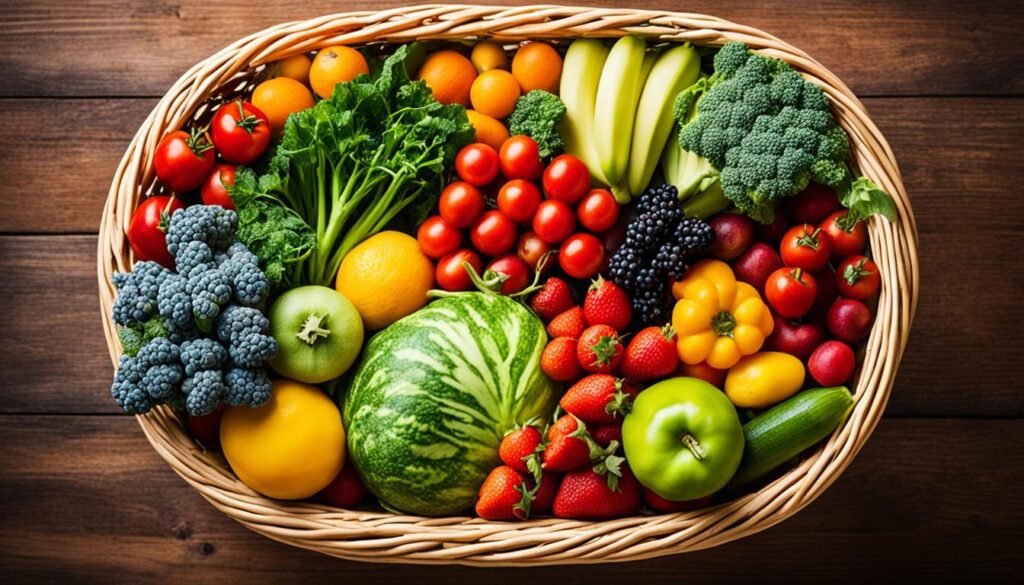
Eating a skin-friendly diet plays a significant role in preventing stress-induced skin aging. When it comes to nourishing our skin, we must prioritize nutrition and make conscious choices about what we consume. A balanced diet rich in antioxidants is key to promoting skin health and combating the effects of stress.
Limiting sugar intake is crucial in maintaining skin health. High sugar consumption can contribute to the breakdown of collagen and elastin, leading to sagging skin and the formation of wrinkles. By reducing our sugar intake, we can preserve the youthfulness and elasticity of our skin.
Instead, we should focus on incorporating foods that are high in antioxidants into our daily meals. Antioxidants are powerful compounds that help protect the skin from damage caused by free radicals and oxidative stress. They neutralize harmful molecules, keeping the skin looking fresh and vibrant.
The Benefits of Antioxidants for Skin Health
Antioxidants offer numerous benefits for our skin. They help to:
- Reduce inflammation: Antioxidants have anti-inflammatory properties that can calm irritated skin and minimize redness.
- Improve skin tone: By promoting collagen production, antioxidants can improve skin elasticity and enhance overall complexion.
- Protect against environmental damage: Antioxidants shield the skin from harmful pollutants and UV radiation, preventing premature aging.
- Hydrate and moisturize: Antioxidants help to lock in moisture, keeping the skin hydrated and plump.
By including antioxidant-rich foods in our diet, such as berries, leafy greens, nuts, and seeds, we can provide our skin with the nutrients it needs to maintain a healthy and youthful appearance.
“A diet rich in antioxidants is like a shield for your skin. It helps to protect against environmental aggressors and keep your skin looking its best.” – Dr. Emily Johnson, Dermatologist
Creating a Skin-Friendly Meal Plan
To incorporate a skin-friendly diet into your daily routine, try the following:
- Start your day with a green smoothie packed with spinach, kale, and antioxidant-rich fruits like berries and oranges.
- Incorporate a variety of colorful vegetables into your meals to ensure a wide range of antioxidants.
- Choose lean protein sources such as fish and poultry, which provide essential amino acids for collagen production.
- Add nuts and seeds as snacks or toppings to salads and yogurt for an extra dose of skin-loving nutrients.
- Stay hydrated by drinking plenty of water and herbal teas, which help flush out toxins and keep the skin glowing.
A skin-friendly diet is not only beneficial for preventing stress-related skin aging but also for overall health and well-being. By nourishing our bodies with the right nutrients, we can achieve radiant and resilient skin that glows from the inside out.
Protecting the Skin from External Stressors
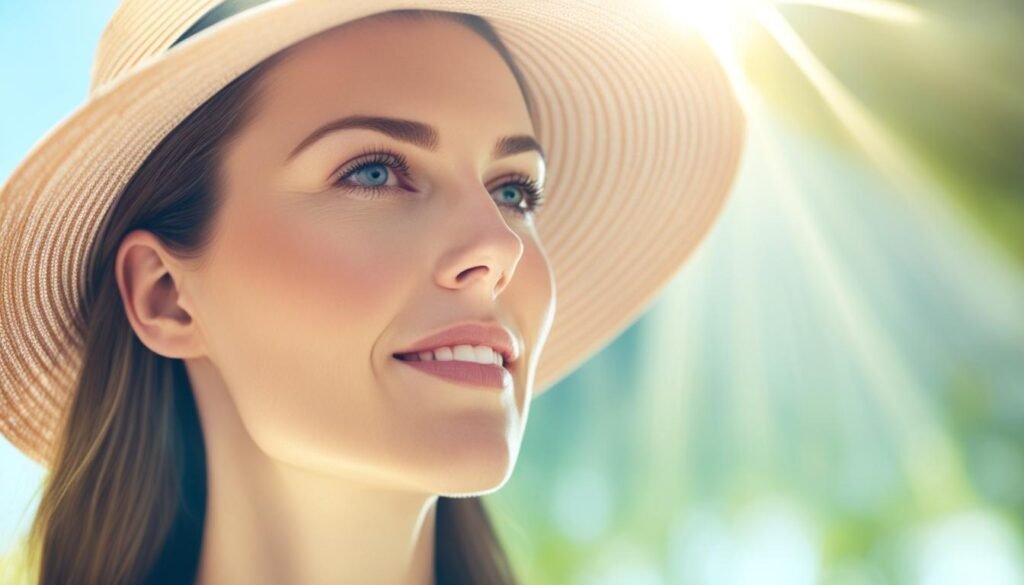
When it comes to preventing stress-induced skin aging, protecting the skin from external stressors is paramount. One of the most significant stressors the skin faces is UV radiation, which can lead to premature aging and other skin issues. By taking proactive measures to shield the skin from harmful UV rays, you can effectively preserve its youthful appearance and overall health.
To safeguard your skin from UV radiation, it is essential to apply a broad-spectrum sunscreen with a minimum SPF of 30. This ensures protection against both UVA and UVB rays, safeguarding the skin from sunburn, DNA damage, and the acceleration of aging signs. Applying sunscreen liberally and regularly throughout the day is crucial, even on cloudy or overcast days when UV rays can still penetrate the skin.
In addition to sunscreen, adopting sun protection tips significantly contributes to maintaining the skin’s health and vitality. Wearing wide-brimmed hats provides added protection for the face and scalp, reducing sun exposure and minimizing the risk of sunburn and skin damage. Moreover, donning sunglasses with UV protection shields the delicate skin around the eyes from harmful UV rays while also safeguarding your eyesight.
To avoid excessive sun exposure, it is advisable to seek shade during peak sunlight hours, typically between 10 a.m. and 4 p.m. This reduces the direct exposure to UV radiation, lowering the risk of skin damage and preventing the signs of UV-induced aging.
By incorporating these sun protection measures into your daily routine, you can effectively preserve the integrity of your skin, preventing UV-induced skin aging and maintaining its youthful appearance for years to come.
| Sun Protection Tips | Benefits |
|---|---|
| Apply broad-spectrum sunscreen with SPF 30 or higher | Shields the skin from harmful UVA and UVB rays, preventing sunburn, DNA damage, and premature aging signs |
| Wear wide-brimmed hats | Provides additional protection for the face and scalp, reducing sun exposure and minimizing the risk of sunburn and skin damage |
| Don sunglasses with UV protection | Protects the delicate skin around the eyes from harmful UV rays, preventing UV-induced aging and safeguarding eyesight |
| Seek shade during peak sunlight hours | Reduces direct exposure to UV radiation, lowering the risk of sunburn, skin damage, and premature aging |
Partnering with Healthcare Professionals for Stress Control

Developing a comprehensive stress control plan requires the expertise and guidance of a primary care physician or healthcare professional. These professionals play a crucial role in providing healthcare support for stress management, offering personalized strategies to effectively manage stress and prevent stress-related skin aging.
Partnering with a primary care physician allows for a holistic wellness approach that addresses both physical and mental well-being. By understanding the connection between stress and skin aging, healthcare professionals can develop a tailored stress control plan that aligns with individual needs and goals.
A primary care physician or healthcare professional can provide:
- Expert advice on stress management techniques
- Guidance on developing a stress control plan
- Support in navigating stress-related challenges
- Recommendations for holistic wellness practices
Through a collaborative partnership, individuals can benefit from a comprehensive approach to stress control that encompasses various facets of holistic wellness, including exercise, nutrition, mental health, and skincare.
Benefits of Partnering with Healthcare Professionals
Working with a primary care physician or healthcare professional offers several advantages in the prevention of stress-induced skin aging:
- Expertise: Healthcare professionals possess a deep understanding of stress-related health issues, including their impact on skin aging. Their expertise ensures that the stress control plan is well-informed, evidence-based, and tailored to individual needs.
- Personalized Strategies: By partnering with a healthcare professional, individuals can receive personalized strategies that address their unique stressors and lifestyle factors. These strategies may include stress reduction techniques, lifestyle modifications, nutritional recommendations, and skincare routines.
- Medical Monitoring: Healthcare professionals can monitor the physical and mental health aspects of stress aging prevention. Regular check-ups and evaluations allow for adjustments to the stress control plan to ensure its effectiveness and address any emerging concerns.
- Emotional Support: Managing stress can be challenging, and healthcare professionals can provide valuable emotional support throughout the process. They can offer guidance, encouragement, and a compassionate ear, empowering individuals to navigate stress-induced skin aging with confidence.
Partnering with a primary care physician or healthcare professional is a proactive step towards achieving optimal stress management and preventing stress-related skin aging. Their expertise, support, and guidance contribute to a comprehensive approach that promotes holistic wellness and enhances overall well-being. Take advantage of their knowledge and experience to develop a stress control plan that addresses your unique needs, allowing you to maintain healthier, more youthful-looking skin.
Conclusion
In conclusion, preventing stress-induced skin aging requires a holistic and proactive approach. By understanding the connection between stress and skin aging, we can implement effective strategies to maintain youthful skin and overall well-being.
Key takeaways for stress-induced skin aging prevention include practicing mindful stress management techniques such as meditation and deep breathing exercises. These activities can help alleviate stress levels and promote a calmer state of mind.
Additionally, incorporating regular exercise into our routine improves circulation, delivering essential nutrients and oxygen to the skin. A skin-friendly diet rich in antioxidants is crucial for countering the damage caused by stress-induced free radicals.
Protecting our skin from external stressors, such as harmful UV rays, is essential. Applying a broad-spectrum sunscreen, wearing protective clothing, and seeking shade can all contribute to preventing stress-induced skin aging.
Lastly, partnering with healthcare professionals can provide valuable guidance and support in developing a comprehensive stress control plan. By prioritizing self-care and adopting healthy habits, we can successfully prevent stress-related skin aging and maintain a youthful appearance.
FAQ
How can I prevent stress-induced skin aging?
To prevent stress-induced skin aging, it’s essential to take a holistic approach. Practice mindful stress management techniques, engage in regular exercise, maintain a skin-friendly diet, protect your skin from external stressors, and consider partnering with healthcare professionals for stress control.
What are the effects of stress on the skin?
Stress can cause skin dehydration, sallowness, roughness, and the development of deep expression lines. The constant release of stress hormones like cortisol contributes to these signs of stress-induced aging.
How does stress impact skin aging?
The connection between stress and skin aging lies in the continuous release of stress hormones, particularly cortisol. These hormones can lead to skin dehydration, sallowness, roughness, and the appearance of deep expression lines.
What is the four-step wellness regimen to combat stress aging?
The four-step wellness regimen recommended by Dr. Howard Murad includes mindfulness and stress management techniques, regular exercise, a balanced diet, and the use of topical skincare products designed for stress-related skin aging. This comprehensive approach focuses on treating the skin from both the inside and outside.
What are some mindful stress management techniques?
Mindful stress management techniques include activities such as meditation, deep breathing exercises, engaging in hobbies, and watching funny movies. These techniques help reduce stress levels, alleviate tension, and promote a calm state of mind, all of which are essential for preventing stress-induced skin aging.
How does exercise contribute to stress aging prevention?
Regular exercise improves circulation, increasing blood flow to the skin and delivering oxygen and nutrients. This improved circulation helps maintain skin health, reduces the appearance of wrinkles, and promotes a youthful glow, making exercise an effective strategy for combating stress-related skin aging.
Why is a skin-friendly diet important for preventing stress-induced skin aging?
A skin-friendly diet involves limiting sugar intake and consuming foods rich in antioxidants, such as fruits and vegetables. Antioxidants counteract the damage caused by free radicals and reduce oxidative stress, promoting healthier and more resilient skin despite stress-induced aging.
How can I protect my skin from external stressors?
To protect your skin from external stressors, especially UV radiation, apply a broad-spectrum sunscreen with an SPF of 30 or higher, wear hats and sunglasses, and seek shade during peak sun hours. These preventive measures help shield the skin from harmful UV rays and prevent UV-induced skin aging.
Is it beneficial to partner with healthcare professionals for stress control?
Yes, partnering with primary care physicians and healthcare professionals can be beneficial for developing a comprehensive stress control plan. These professionals can provide guidance, support, and personalized strategies to help manage stress effectively, resulting in better skin health and overall well-being.
What are the key takeaways for stress-induced skin aging prevention?
To prevent stress-induced skin aging, remember to practice mindful stress management techniques, engage in regular exercise, maintain a skin-friendly diet, protect your skin from external stressors, and consider partnering with healthcare professionals for stress control. By taking these proactive steps, you can maintain your skin’s youthful appearance and overall well-being.

